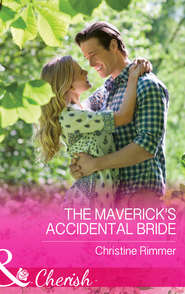По всем вопросам обращайтесь на: info@litportal.ru
(©) 2003-2024.
✖
The Man Who Had Everything
Автор
Год написания книги
2019
Настройки чтения
Размер шрифта
Высота строк
Поля
Her glance slid away. He knew what she was thinking—after the way he’d behaved, he had no place talking about what was right. But in the end, she only said, “Suit yourself,” and clicked her tongue for Trixiebelle to get moving again.
At the ranch, she went on in the barn to unsaddle the mare. Grant watched her go. She hadn’t said a word to him the whole ride.
He hitched Titan to the rail by the front porch and mounted the steps.
Inside, he followed his nose to the kitchen where something wonderful was in the oven and Marie stood at the peninsula of counter between the kitchen and the breakfast area, rolling out dough for pies. Sliced apples, dusted in sugar and cinnamon, waited in a bowl nearby.
He forced a hearty tone. “How come it always smells so good in here?”
She stopped rolling and grinned at him. She had flour on her nose. “Stick around awhile and you just might get yourself a warm piece of pie.”
He hadn’t bothered hanging his hat by the door. Instead he held it in his hands. Which seemed sadly fitting. He fiddled with the tattered brim. “Believe me, I’m tempted. But I’ve got to get back…”
Marie tipped her head to the side and frowned. “Okay. What’s the matter? You got a look like someone just shot your best mule.”
He swore.
She plunked the rolling pin down and wiped her hands on the apron she’d tied over her jeans. “I’ll get you a beer…”
“No, thanks. Marie, I’ve got something I have to say.”
She made a small sound of mingled distress and expectation.
And he went ahead and told her, flat out. “I’m selling the ranch. You’ll all have to be out by the thirty-first of August.”
What had he imagined? That she’d go all to pieces? Not Marie Julen. Like her daughter, she was stronger and tougher than that.
“Well,” she said evenly, after a moment. “All right.” And she picked up the rolling pin again and got back to work rolling out that pie dough.
He stood there in the doorway from the central hall and wondered what to do next.
Marie glanced his way again. “Grant. It’s okay. It’s not the end of the world. Things change. Life goes on.”
He almost laughed. “That’s what I was going to say to you.”
She pointed her rolling pin at the table. “Will you sit down, please? You’re making me nervous, looming there in the doorway like that.”
“No, I really have to get back.”
“Good enough, then.”
But he just stood there and watched her plump, clever hands as she carefully folded the circle of flattened pie dough into quarters, lifted it off the floured board and gently set it in the waiting pie pan.
He remembered that he’d offered her no reassurances. “Marie, I promise you. I’ll see you’re taken care of.”
“Well, of course you will.” She opened the folded crust, shaped it to fit the sides of the pan and took up a rolling cutter.
He watched her expertly trim the excess crust from the edge, turning the pan in a circle as she worked. “There’ll be another job, a good job,” he vowed. “I was thinking you might want to be cooking, maybe something in town, at a coffee shop, something like that…”
She had a second crust ready and took the cutter to it, sectioning it into strips to make one of those fancy lattice-type top crusts that always made her pies stand out for looks, as well as flavor. “Grant.” She spoke chidingly, her skilled, swift hands continuing their work. “Stop beating yourself up. We’ll be fine. Don’t worry.”
“I told Steph.”
Those busy hands hesitated—but only for a second. “Ah.”
“I don’t think she’s ever going to forgive me.”
“You give her time, she’ll be okay.”
“Damn it, Marie. I don’t know about that.”
Behind him, down at the other end of the central hall, he heard the front door open. Steph. Her footsteps approached.
He made himself turn to face her, found her mouth set in a stern line and her eyes flat, giving him nothing.
“Did you tell her?” she asked.
Marie said sweetly, “Yes, he did.” A glance back over his shoulder showed him she hadn’t even looked up from laying the strips of dough in a crosswise pattern onto a floured sheet of aluminum foil.
“You leaving, then?” Steph said. It wasn’t really a question.
The thing was, even while she was looking at him with those dead eyes, he still wanted to reach for her, haul her up close, breathe in the warm, sweet scent of her hair, feel her body snug and soft all along the length of his. He wanted to lower his head and crush his mouth to those unwilling lips—until she sighed and opened for him.
But of course, he did no such thing. He said, “I have to talk to Rufus and Jim.”
“Don’t worry. I already told them.”
“Great,” he said, guiltily tamping down a flare of resentment at her for taking a job that should have been his. “Still, I want to have a few words with them.”
“They’re in the barn.”
“Well. All right, then.” He hit his hat on his thigh. “See you later, Marie.”
Marie sent him a smile as loving and warm as any she’d ever bestowed on him. “Ride safe, now.”
“I will. He nodded at the cold-eyed woman standing beside him. “Steph.”
“Grant.” She said his name as if it made a bad taste in her mouth.
In the barn, he reassured Rufus and Jim that he’d find other jobs for them. Jim nodded and thanked him.
Rufus said, “Hell, boy. I know you’ll take care of us. Haven’t you always?” He didn’t say anything about how John Clifton was probably rolling over in his grave at the thought that his own son planned to sell the ranch he’d sweated blood over, the ranch that had been in the Clifton family for five generations.
Grant was damn grateful for Rufus’s silence on that subject.
He tipped his hat at the cowboys and left the barn. Out in the sun, Titan was waiting, hitched where he’d left him. He mounted up and got the hell out of there.
* * *











